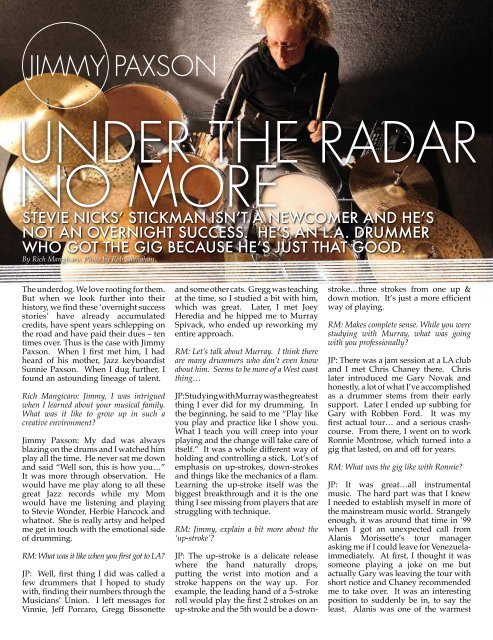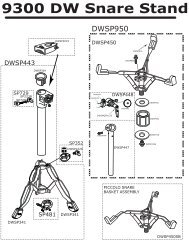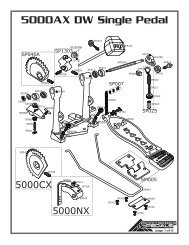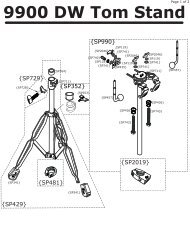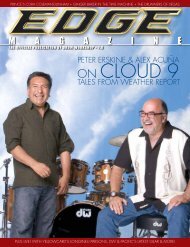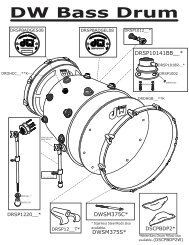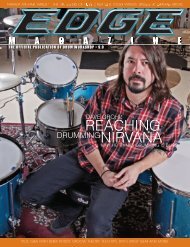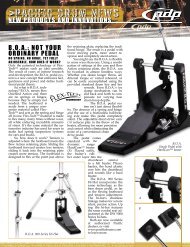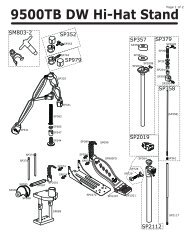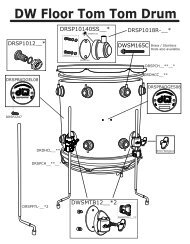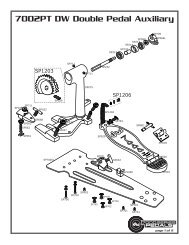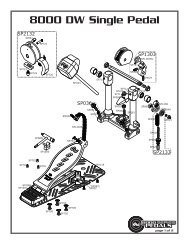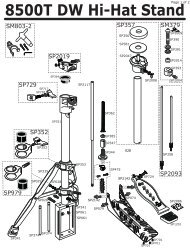Man these feel really really good. - Drum Workshop
Man these feel really really good. - Drum Workshop
Man these feel really really good. - Drum Workshop
You also want an ePaper? Increase the reach of your titles
YUMPU automatically turns print PDFs into web optimized ePapers that Google loves.
Jimmy paxSon<br />
under the radar<br />
no more<br />
stevie nicks’ stickman isn’t a newcomer and He’s<br />
not an overnigHt success. He’s an l.a. drummer<br />
wHo got tHe gig because He’s just tHat <strong>good</strong>.<br />
By Rich <strong>Man</strong>gicaro. Photo by Rob Shanahan.<br />
The underdog. We love rooting for them.<br />
But when we look further into their<br />
history, we find <strong>these</strong> ‘overnight success<br />
stories’ have already accumulated<br />
credits, have spent years schlepping on<br />
the road and have paid their dues – ten<br />
times over. Thus is the case with Jimmy<br />
Paxson. When I first met him, I had<br />
heard of his mother, Jazz keyboardist<br />
Sunnie Paxson. When I dug further, I<br />
found an astounding lineage of talent.<br />
Rich <strong>Man</strong>gicaro: Jimmy, I was intrigued<br />
when I learned about your musical family.<br />
What was it like to grow up in such a<br />
creative environment?<br />
Jimmy Paxson: My dad was always<br />
blazing on the drums and I watched him<br />
play all the time. He never sat me down<br />
and said “Well son, this is how you…”<br />
It was more through observation. He<br />
would have me play along to all <strong>these</strong><br />
great Jazz records while my Mom<br />
would have me listening and playing<br />
to Stevie Wonder, Herbie Hancock and<br />
whatnot. She is <strong>really</strong> artsy and helped<br />
me get in touch with the emotional side<br />
of drumming.<br />
RM: What was it like when you first got to LA?<br />
JP: Well, first thing I did was called a<br />
few drummers that I hoped to study<br />
with, finding their numbers through the<br />
Musicians’ Union. I left messages for<br />
Vinnie, Jeff Porcaro, Gregg Bissonette<br />
and some other cats. Gregg was teaching<br />
at the time, so I studied a bit with him,<br />
which was great. Later, I met Joey<br />
Heredia and he hipped me to Murray<br />
Spivack, who ended up reworking my<br />
entire approach.<br />
RM: Let’s talk about Murray. I think there<br />
are many drummers who don’t even know<br />
about him. Seems to be more of a West coast<br />
thing…<br />
JP: Studying with Murray was the greatest<br />
thing I ever did for my drumming. In<br />
the beginning, he said to me “Play like<br />
you play and practice like I show you.<br />
What I teach you will creep into your<br />
playing and the change will take care of<br />
itself.” It was a whole different way of<br />
holding and controlling a stick. Lot’s of<br />
emphasis on up-strokes, down-strokes<br />
and things like the mechanics of a flam.<br />
Learning the up-stroke itself was the<br />
biggest breakthrough and it is the one<br />
thing I see missing from players that are<br />
struggling with technique.<br />
RM: Jimmy, explain a bit more about the<br />
‘up-stroke’?<br />
JP: The up-stroke is a delicate release<br />
where the hand naturally drops,<br />
putting the wrist into motion and a<br />
stroke happens on the way up. For<br />
example, the leading hand of a 5-stroke<br />
roll would play the first 2 strokes on an<br />
up-stroke and the 5th would be a down-<br />
stroke…three strokes from one up &<br />
down motion. It’s just a more efficient<br />
way of playing.<br />
RM: Makes complete sense. While you were<br />
studying with Murray, what was going<br />
with you professionally?<br />
JP: There was a jam session at a LA club<br />
and I met Chris Chaney there. Chris<br />
later introduced me Gary Novak and<br />
honestly, a lot of what I’ve accomplished<br />
as a drummer stems from their early<br />
support. Later I ended up subbing for<br />
Gary with Robben Ford. It was my<br />
first actual tour… and a serious crashcourse.<br />
From there, I went on to work<br />
Ronnie Montrose, which turned into a<br />
gig that lasted, on and off for years.<br />
RM: What was the gig like with Ronnie?<br />
JP: It was great…all instrumental<br />
music. The hard part was that I knew<br />
I needed to establish myself in more of<br />
the mainstream music world. Strangely<br />
enough, it was around that time in ‘99<br />
when I got an unexpected call from<br />
Alanis Morissette’s tour manager<br />
asking me if I could leave for Venezuela-<br />
immediately. At first, I thought it was<br />
someone playing a joke on me but<br />
actually Gary was leaving the tour with<br />
short notice and Chaney recommended<br />
me to take over. It was an interesting<br />
position to suddenly be in, to say the<br />
least. Alanis was one of the warmest<br />
individuals I’d ever met and I’m happy<br />
to have been there.<br />
RM: Jim, being thrown into such a situation,<br />
how do you learn to nail it, on-the-fly like<br />
that?<br />
JP: I follow <strong>these</strong> five steps: 1) Listen to<br />
the tune. 2) Make a chart. 3) Play to the<br />
tune, with the chart. 4) Play to the chart,<br />
without the tune. 5) Play the tune,<br />
without the chart or the recording. My<br />
goal is that when it comes time to play, I<br />
don’t need to reference anything.<br />
RM: So, how did Stevie Nicks find you?<br />
JP: On a break from touring, I came home<br />
and my cartage guy, Ross Garfieldowner<br />
of <strong>Drum</strong> Doctors, had heard that<br />
Waddy Wachtel, Stevie’s bandleader,<br />
was looking for a drummer for her.<br />
Ross recommended me, for which I’m<br />
eternally thankful.<br />
RM: Along with learning all the songs, I<br />
know that you’re great at focusing on the<br />
right drum sound for the gig. How did you<br />
apply that to the Stevie audition?<br />
JP: I am a firm believer that bringing the<br />
right sound for any situation is key. I<br />
knew from learning Stevie’s music that<br />
I wanted the snare tuned way down into<br />
that Mick Fleetwood/Russ Kunkel/Stan<br />
Lynch zone. Ross has an old 7x14 Tama<br />
bell brass snare that I rented a few times<br />
and we both agreed it would deliver. At<br />
the audition, I hit it once and everyone<br />
noticed. That IS the sound for Stevie’s<br />
music and she heard it right away. To<br />
achieve this now, I use a DW 8”x14”<br />
Edge snare that just sounds unreal.<br />
RM: When did you find out you had the gig?<br />
JP: I was on the road with Edgar Winter<br />
and I didn’t hear anything from them<br />
for 3 or 4 days. In an airport, I noticed<br />
a missed call from Waddy. His message<br />
said: “Ah, Jim, it’s Waddy Wachtel.<br />
Listen, I don’t know what to tell ya…<br />
but, you got the gig. Welcome to the<br />
family. Hope you’re not doing anything<br />
for the next year or so!” That was about<br />
5 years ago.<br />
RM: Wow! How did it <strong>feel</strong>, getting that call?<br />
JP: Incredible. I’ve had other big gigs<br />
but that call was life changing. I had<br />
about 3 weeks of back-to-back work in<br />
Europe with both Sophie B. Hawkins<br />
and Edgar so I had no choice but to<br />
learn all the songs in hotel rooms and<br />
actually got home only the night before<br />
the first rehearsal.<br />
RM: So, without the kit to learn the tunes,<br />
how did you prepare so you felt ready?<br />
JP: I transcribed pretty much note for<br />
note what Mick, Russ Kunkel and<br />
Stan Lynch played and pretty much<br />
slept with headphones on. I had some<br />
pads in my room…that, with a lot of<br />
determination, I got through it. When<br />
I got home, I entered what I call “Camp<br />
Waddy!”<br />
RM: How is it playing with Lenny Castro?<br />
“My goal is that when<br />
it comes time to<br />
play, I don’t need to<br />
reference anything.”<br />
JP: Playing with Lenny is effortless…<br />
he’s simply the deadliest percussionist<br />
there is - period. His <strong>feel</strong> and choices are<br />
second to none and we quickly became<br />
real close, both on stage and off. I thank<br />
God for every moment with him and<br />
on top of playing all those great songs,<br />
Stevie gives us a big solo every night.<br />
With Lenny, you never know which<br />
direction it’s gonna go. For example,<br />
one night he may play his entire solo<br />
on his gong bass drum and a cowbell…<br />
other nights, he may use his entire rig.<br />
We both look at our solos as a place to<br />
be spontaneous. We have a set ending<br />
worked out, but other than that, it’s<br />
wide open.<br />
RM: Who were your influences that helped<br />
you learn to construct a <strong>good</strong> solo?<br />
JP: Tony Williams’ Lifetime “Believe It”<br />
record is THE drum bible. Also, there’s<br />
a live solo with Steve Gadd and Ralph<br />
McDonald on a Grover Washington<br />
Jr. video, which blows my mind. Any<br />
Dennis Chambers or Simon Phillips<br />
open solo and finally, John Bonham on<br />
Led Zeppelin’s “How The West Was<br />
Won”. These are all huge for me.<br />
RM: Jimmy, working for such diverse female<br />
singers, how do you adjust your playing to<br />
fit their varied styles?<br />
JP: I try to get acclimated to where<br />
they lay the cadence of their vocals, in<br />
relation to the beat - their way of <strong>feel</strong>ing<br />
the groove. Then, I connect with what<br />
they’re saying, lyrically and emotionally<br />
and convey dynamically what’s needed<br />
from there. It’s all about the subtleties.<br />
RM: That’s so true. So, what’s happening<br />
currently for you?<br />
JP: For a while, I was working with<br />
Giorgia Todrani, who is one of Italy’s<br />
most iconic singers. Recently, I’ve<br />
been doing some one-offs with Johnny<br />
Rivers, who hits include “Memphis”<br />
and “Secret Agent <strong>Man</strong>”. Other recent<br />
projects include CDs with A Fine<br />
Frenzy, Sharon Little, The Casualties<br />
Of Jazz, Julian Coryell and I recently<br />
did an eclectic tour opening for Louden<br />
Wainwright III, with my girlfriend,<br />
singer/songwriter Jenni Alpert.<br />
RM: Jimmie, your drum collection is <strong>really</strong><br />
a drummer’s playground!<br />
JP: I’m a bit of a collector. DW has <strong>really</strong><br />
raised the bar over the years on drum<br />
quality. I have quite a few of their kits,<br />
including Stevie’s favorite, a VLT Gold<br />
Glass finish set. I am also a junkie for<br />
old classic American drums, as well as<br />
import mahogany drums from Taiwan<br />
and Japan.<br />
Regarding cymbals, everyone at Paiste is<br />
like family to me and I use a combination<br />
of their lines. For drumheads, I use<br />
Evans and my sticks are Vic Firth.<br />
RM: Talk about your studio a bit?<br />
JP: My room is a recording/rehearsal<br />
space…I operate both Pro Tools and<br />
Logic. The room is about 20’ x 40’ with<br />
a 16’ ceiling and I do a lot of sessions<br />
there. I have an extensive drum<br />
collection, including some cool, vintage<br />
kits and tons of percussion stuff, so it’s<br />
a one-stop shop.<br />
RM: Jimmy, what would you say to players<br />
who are trying to make something happen<br />
for themselves, especially given our tough<br />
economic situation?<br />
JP: WORK ON YOUR TIME AND BE<br />
PREPARED!! With the Internet and all<br />
the available resources, the knowledge<br />
is out there to be absorbed 24/7. Like<br />
they say, ‘practice at home’. Once you<br />
get on a gig, if you’re lucky enough to<br />
have people to lean on, know that they’ll<br />
only carry you so far before you’re<br />
expected to stand on your own. Always<br />
support the music first and know the<br />
boundaries…then know when and how<br />
to step out without being musically<br />
distracting. The pressure is immense,<br />
but if you love music and you play<br />
for the song, that’s what it’s all about.<br />
You never know when the call is going<br />
to come in so just keep growing…and<br />
keep going.<br />
[edge 8.0] 25


